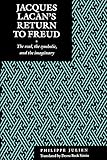Jacques Lacan's Return to Freud : The Real, the Symbolic, and the Imaginary / Philippe Julien.
Material type: TextSeries: Psychoanalytic Crossroads ; 2Publisher: New York, NY : New York University Press, [1994]Copyright date: ©1994Description: 1 online resourceContent type:
TextSeries: Psychoanalytic Crossroads ; 2Publisher: New York, NY : New York University Press, [1994]Copyright date: ©1994Description: 1 online resourceContent type: - 9780814741986
- 9780814743232
- 150.19/5/092 20
- online - DeGruyter
| Item type | Current library | Call number | URL | Status | Notes | Barcode | |
|---|---|---|---|---|---|---|---|
 eBook
eBook
|
Biblioteca "Angelicum" Pont. Univ. S.Tommaso d'Aquino Nuvola online | online - DeGruyter (Browse shelf(Opens below)) | Online access | Not for loan (Accesso limitato) | Accesso per gli utenti autorizzati / Access for authorized users | (dgr)9780814743232 |
Browsing Biblioteca "Angelicum" Pont. Univ. S.Tommaso d'Aquino shelves, Shelving location: Nuvola online Close shelf browser (Hides shelf browser)

|

|

|

|

|

|

|
||
| online - DeGruyter Is Academic Feminism Dead? : Theory in Practice / | online - DeGruyter The Fair Sex : White Women and Racial Patriarchy in the Early American Republic / | online - DeGruyter Changing Faith : The Dynamics and Consequences of Americans' Shifting Religious Identities / | online - DeGruyter Jacques Lacan's Return to Freud : The Real, the Symbolic, and the Imaginary / | online - DeGruyter Love the Sin : Sexual Regulation and the Limits of Religious Tolerance / | online - DeGruyter Science for Segregation : Race, Law, and the Case against Brown v. Board of Education / | online - DeGruyter Inner Lives : Voices of African American Women In Prison / |
restricted access online access with authorization star
http://purl.org/coar/access_right/c_16ec
Among the numerous introductions to Lacan published to date in English, Philippe Julien's work is certainly outstanding. Beyond its conceptual clarity the book constitutes an excellent guide to Lacanian psychoanalytic practice.--Andr Patsalides, Psychoanalyst and President, Lacanian School of PsychoanalysisFrom 1953 to 1980, Jacques Lacan sought to accomplish a return to Freud beyond post- Freudianism. He defined this return as a new convenant with the meaning to the Freudian discovery. Each year through his teaching, he brought about this return. What was at stake in this renewal?Philippe Julien, who joined Lacan's Ecole Freudienne de Paris in 1968, attempts to answer this question. Situtated in the period after-Lacan, Julien shows that Lacan's return to Freud was neither a closing of the Freudian text by responding to questions left unanswered nor a reopening of the text by giving endless new interpretations. Neither dogmatic nor hermeneutic, Lacan's return to Frued was the return of an inevitable discordance between our experience of the unconscious and any attempt to give an account of it. For the unconscious, by its very nature, disappears at the same moment as it is discovered. It is in this sense that the author can claim that Lacan's return to Freud will have been Freudian.Constantly challenging the reader to submit to the rigors of Lacan's sinuous thinking, this penetrating work goes far beyond being a mere introduction. Rendered into elegant English by the American translator, who added numerous footnotes and scholarly references to the French original, this study brings Lacanian scholarship among English readers to a new level of sophistication.Neither dogmatic nor hermeneutic, Lacan's return to Freud was the return of an inevitable discordance between our experience of the unconscious and any attempt to give an account of it. For the unconscious, by its very nature, disappears at the same moment as it is discovered. It is in this sense that the author can claim that Lacan's return to Freud was Freudian.
Mode of access: Internet via World Wide Web.
In English.
Description based on online resource; title from PDF title page (publisher's Web site, viewed 01. Nov 2023)


